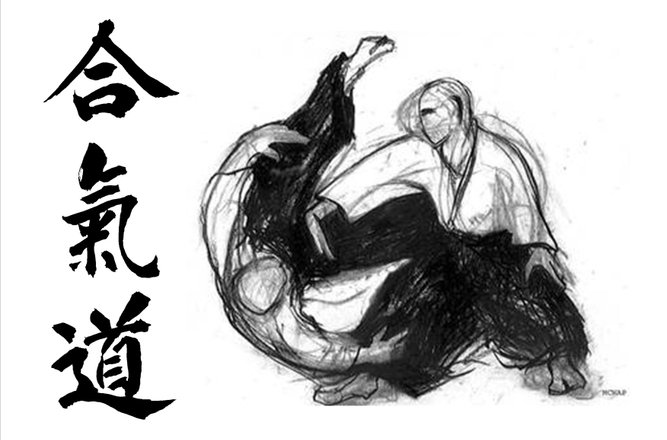Teacher
Professional
- Messages
- 2,669
- Reaction score
- 818
- Points
- 113
"Yes, but ..." or psychological aikido

Conflicts are inevitable. Not everyone is given the natural ability to smooth them out correctly. Sometimes you have to learn. Psychological aikido is one of the conflict management techniques that is designed to do this. It is simple, straightforward, and, most importantly, effective. The technique has always existed in practice, but the theory has appeared recently thanks to the work of Mikhail Litvak, a Russian psychotherapist.

The peculiarity of the martial art of aikido is to use the strength of the enemy against himself. Adapted to the communication environment, this method is used in tense negotiations or conflict situations and involves returning the opponent to his own aggression in order to get what he wants from the interlocutor.
Newton's law says: the force of action is equal to the force of reaction. Consequently, the more rudely a person responds to his opponent, the more fiercely he defends his position , the more aggression he receives in response. The main principle of aikido is to win by giving way. To persuade a person to his point of view, first of all, you need to agree with him, and "mirroring" his manner of speaking and behaving. And then, in a calm tone, propose your own version of the development of events. Thus, the person retains his strength, does not irritate the opponent and ultimately wins.
In fact, psychological aikido is formulated as "Yes, but ..." Let's talk in more detail.
When is the technique applicable?
It is worth remembering that Litvak's technique is almost universal. She is good in cases of accusation and provocative behavior, when you just need to cool the ardor and smooth over the rough edges. This can be communication with an angry boss, with random people you meet, with prejudiced loved ones.
If the problem requires a serious joint discussion, then the technique should not be used at all stages of the conversation, but only at the beginning, end of the conversation and at the moments when the opponent gets personal or too "boils over".
In practice, this implies, first of all, agreement with the opponent. It makes conflict impossible, since collision presupposes opposing opinions.
The people call this "taking the bull by the horns", that is, to attack, but not to attack.
- Again, I did not bring you every penny of your salary. I understand you're angry. Really it was impossible not to celebrate the paycheck at least once. Spinelessness, yes. Today I would rather not sit down at the table with you, so as not to be an eyesore with my appearance.
Direct depreciation is applied here and now at the time of the conflict. Its use consists of several principles: consent, stroking, consent-objection and synonymy.

Let's consider them in more detail.
The consent we mentioned above renders conflict as such meaningless. Note that sometimes you have to repulse the attack several times during a particularly angry, blind attack.
- You're late for a meeting again! How can that be? It doesn't fit in my head !!!
- Yes, I was late. I myself do not understand how this happens. In my head, too, it is impossible to fit my behavior.
But in some situations it is necessary to let the opponent just speak out. There are times when a person falls under a hot hand. It is then that you should not rush. “Silence and listen,” as Professor Preobrazhensky used to say.
The principle of "stroking", which helps to reduce the ardor of the opponent, is that by responding with consent, you need to insert a compliment phrase into the line that directly relates to the topic of conversation. Helps to reduce the intensity of passions if the opponent is militant.
- Where are you going! You can't see, the floor is wet here. Are you so inconsiderate?
- Indeed, where does it take me to the freshly washed parquet. Here is the same absent-minded person I am, really. And you are great, you work, you bring order, cleanliness.
A casual objection, followed by an agreement spiced up with a “stroke,” can sometimes turn the conversation in the right direction without too much tension on either side. If necessary, the objection can be ended with preventive depreciation. This leaves the opponent completely unarmed. But this is aerobatics, you need to learn this gradually, starting with small situations and not very influential people.
- Why do you put up with such a wife, but she manipulates you?! Let's go to football, because the tickets have already been bought!
- Yes, you're right, I almost always agree with the opinion of my wife, but I thought the same way as she did initially. Today there is too much wind and rain, I do not want to risk my health.
I understand that you will be offended, because you bought tickets for your own money. I promise we'll go next time the weather is normal. And at my expense, of course.
Positive synonyms that can and should be used to replace the opponent's caustic phrases at a time when he is not furious. Consent and easy objection , skillfully built on "smooth" words, propels the conversation into a calmer channel. It is worth using them in the middle of a conversation, when the first ardor of the opponent is knocked down.
- Well, you've got a mess!
- Yes, I can't do without creative disorder.
Super damping combines the two previous options. By preventing the opponent's attacks, the interlocutor subsequent exaggerates agreement with what has already been said.
- Insolent, where are you getting into the minibus, pushing like that?!
- And they got insolent and mad, because in the minibus there is nowhere for an apple to fall, but I still hope to get into it.
Delayed depreciation, or, more simply, late, is used most often in the early stages of mastering the method. If it was not possible to resolve the conflict today, tomorrow you can return to the conversation, having psychological aikido in stock: enough words and agreement.
- You said yesterday that I was inattentive. I agree one hundred percent. During the night I remembered that I had ignored your invitation to dine together. Such a muddler.
As you can see, everything is quite simple and even primitive, one might say. To follow inertia, follow the interlocutor, and thus leave no room for further struggle - this is the main advantage of psychological aikido. This technique is easy to learn. And this must be done. After all, it can be used in family relationships, and in business conversations, and in everyday life.

Conflicts are inevitable. Not everyone is given the natural ability to smooth them out correctly. Sometimes you have to learn. Psychological aikido is one of the conflict management techniques that is designed to do this. It is simple, straightforward, and, most importantly, effective. The technique has always existed in practice, but the theory has appeared recently thanks to the work of Mikhail Litvak, a Russian psychotherapist.

The peculiarity of the martial art of aikido is to use the strength of the enemy against himself. Adapted to the communication environment, this method is used in tense negotiations or conflict situations and involves returning the opponent to his own aggression in order to get what he wants from the interlocutor.
Newton's law says: the force of action is equal to the force of reaction. Consequently, the more rudely a person responds to his opponent, the more fiercely he defends his position , the more aggression he receives in response. The main principle of aikido is to win by giving way. To persuade a person to his point of view, first of all, you need to agree with him, and "mirroring" his manner of speaking and behaving. And then, in a calm tone, propose your own version of the development of events. Thus, the person retains his strength, does not irritate the opponent and ultimately wins.
In fact, psychological aikido is formulated as "Yes, but ..." Let's talk in more detail.
When is the technique applicable?
It is worth remembering that Litvak's technique is almost universal. She is good in cases of accusation and provocative behavior, when you just need to cool the ardor and smooth over the rough edges. This can be communication with an angry boss, with random people you meet, with prejudiced loved ones.
If the problem requires a serious joint discussion, then the technique should not be used at all stages of the conversation, but only at the beginning, end of the conversation and at the moments when the opponent gets personal or too "boils over".
In practice, this implies, first of all, agreement with the opponent. It makes conflict impossible, since collision presupposes opposing opinions.
The people call this "taking the bull by the horns", that is, to attack, but not to attack.
- Again, I did not bring you every penny of your salary. I understand you're angry. Really it was impossible not to celebrate the paycheck at least once. Spinelessness, yes. Today I would rather not sit down at the table with you, so as not to be an eyesore with my appearance.
Direct depreciation is applied here and now at the time of the conflict. Its use consists of several principles: consent, stroking, consent-objection and synonymy.

Let's consider them in more detail.
The consent we mentioned above renders conflict as such meaningless. Note that sometimes you have to repulse the attack several times during a particularly angry, blind attack.
- You're late for a meeting again! How can that be? It doesn't fit in my head !!!
- Yes, I was late. I myself do not understand how this happens. In my head, too, it is impossible to fit my behavior.
But in some situations it is necessary to let the opponent just speak out. There are times when a person falls under a hot hand. It is then that you should not rush. “Silence and listen,” as Professor Preobrazhensky used to say.
The principle of "stroking", which helps to reduce the ardor of the opponent, is that by responding with consent, you need to insert a compliment phrase into the line that directly relates to the topic of conversation. Helps to reduce the intensity of passions if the opponent is militant.
- Where are you going! You can't see, the floor is wet here. Are you so inconsiderate?
- Indeed, where does it take me to the freshly washed parquet. Here is the same absent-minded person I am, really. And you are great, you work, you bring order, cleanliness.
A casual objection, followed by an agreement spiced up with a “stroke,” can sometimes turn the conversation in the right direction without too much tension on either side. If necessary, the objection can be ended with preventive depreciation. This leaves the opponent completely unarmed. But this is aerobatics, you need to learn this gradually, starting with small situations and not very influential people.
- Why do you put up with such a wife, but she manipulates you?! Let's go to football, because the tickets have already been bought!
- Yes, you're right, I almost always agree with the opinion of my wife, but I thought the same way as she did initially. Today there is too much wind and rain, I do not want to risk my health.
I understand that you will be offended, because you bought tickets for your own money. I promise we'll go next time the weather is normal. And at my expense, of course.
Positive synonyms that can and should be used to replace the opponent's caustic phrases at a time when he is not furious. Consent and easy objection , skillfully built on "smooth" words, propels the conversation into a calmer channel. It is worth using them in the middle of a conversation, when the first ardor of the opponent is knocked down.
- Well, you've got a mess!
- Yes, I can't do without creative disorder.
Super damping combines the two previous options. By preventing the opponent's attacks, the interlocutor subsequent exaggerates agreement with what has already been said.
- Insolent, where are you getting into the minibus, pushing like that?!
- And they got insolent and mad, because in the minibus there is nowhere for an apple to fall, but I still hope to get into it.
Delayed depreciation, or, more simply, late, is used most often in the early stages of mastering the method. If it was not possible to resolve the conflict today, tomorrow you can return to the conversation, having psychological aikido in stock: enough words and agreement.
- You said yesterday that I was inattentive. I agree one hundred percent. During the night I remembered that I had ignored your invitation to dine together. Such a muddler.
As you can see, everything is quite simple and even primitive, one might say. To follow inertia, follow the interlocutor, and thus leave no room for further struggle - this is the main advantage of psychological aikido. This technique is easy to learn. And this must be done. After all, it can be used in family relationships, and in business conversations, and in everyday life.

